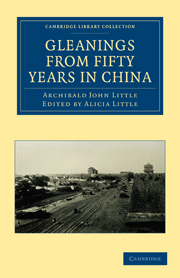FOREWORD
Published online by Cambridge University Press: 10 November 2010
Summary
The death of Mr. Archibald Little, who passed away at Falmouth in the autumn of 1908, after a long period of failing health, will be felt as a loss not only by his friends but by all who are interested in China. For his experience was in some respects unique. A merchant by the accident of career, he was a scholar and a traveller by bent of character and preference. Others have had larger and more successful commercial relations; others have travelled more extensively; others have acquired a more profound knowledge of the Chinese language; others have evinced a keen and sympathetic insight into the Chinese mind and turns of thought; others have recorded their experiences in thoughtful and sympathetic language. Mr. Little's forte was that he possessed all these qualifications in a sufficient degree to make him a capable pioneer, an interesting talker, an instructive writer, and a sympathetic host or guest with educated Chinese. I have said that the bent of his mind and tastes was towards science and travel rather than towards commerce; and circumstances chanced, perhaps, to confirm the inclination; for he had hardly arrived in China (under engagement as tea-taster to a German firm), in 1859, ere the hindrance to commerce caused by the presence of the T'aip'ings gave him leisure to travel through the region they occupied, extending from the head waters of the Tsientang to the Poyang Lake—a journey which his knowledge of Chinese materially helped him to accomplish.
- Type
- Chapter
- Information
- Gleanings from Fifty Years in China , pp. v - xPublisher: Cambridge University PressPrint publication year: 2010First published in: 1910
- 1
- Cited by

